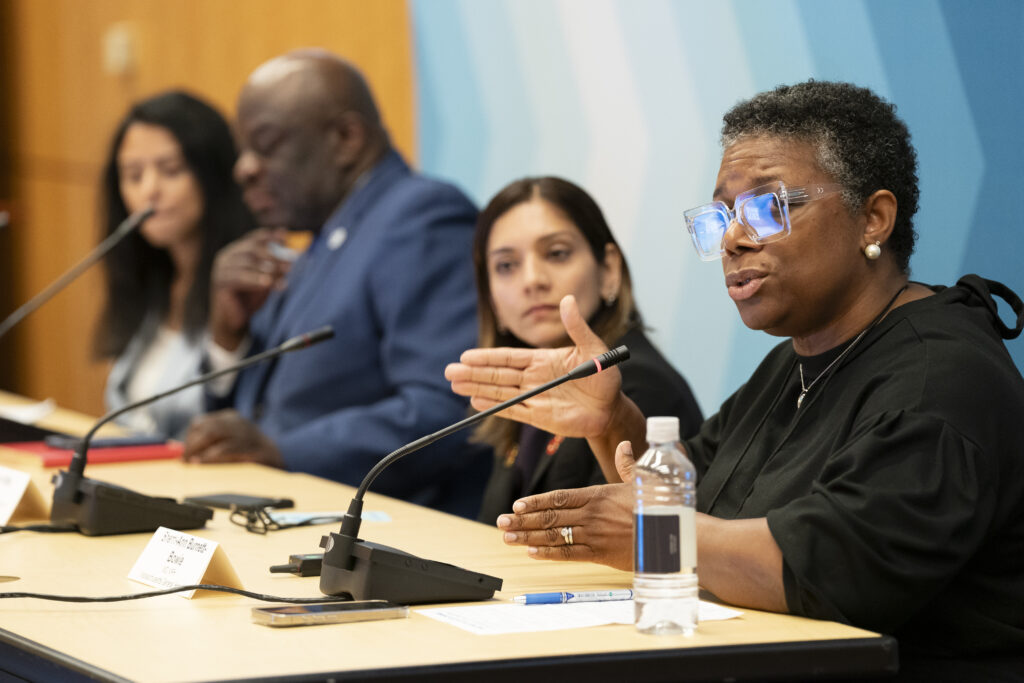Encoding Equity in Clinical Practice and Research
The Encoding Equity Alliance is committed to driving change in clinical research and practice, identifying inappropriate use of race in algorithms and guidelines, redesigning more accurate and equitable decision tools, and collecting and communicating evidence to ensure that all patients receive the best care possible.
Launched in 2024, the Alliance galvanizes collective action to amplify our impact, making change more urgently and comprehensively than any one organization or group of stakeholders can. Led by CMSS and generously supported by the Doris Duke Foundation, the Alliance engages and activates more individuals and organizations across medicine, research, funding, publishing, and technology sectors to take leadership, ownership, and action to advance health equity.
About the Program:
There is growing consensus that using race as a biologic factor in clinical decision-making may be harmful to patients.
A national drive to boost awareness of this issue is long overdue, so we’re working together to ensure that clinical decision-making tools, including clinical guidelines and algorithms, reflect unbiased and valid evidence. Our goals include changing the way in which race is considered in research design and ensuring that all patients experience the best possible health outcomes.
Value:
We envision a future where the appropriate use of race in research design and clinical guidance will drive toward the best possible outcomes for all patients – a future where the tools that guide patient care are informed by rigorous methods and strong evidence to prevent potential harm to patients. This is a future where more equitable clinical decision-making tools lead to more equitable health outcomes.

Recent Event:
Encoding Health Equity Summit 2025
June 24, 2025
Audience:
This challenge demands all hands on deck. Individuals and organizations who can catalyze change include:
- Funders who can incentivize research behavior.
- Medical Societies who create guidelines, algorithms, and clinical guidance for practice.
- AI/ML Community which can develop tools to assess bias and fairness in algorithms.
- Publishers who inform and incentivize researchers, and can codify advances.
- Researchers who can ensure that race is appropriately used in current and future clinical research.
- Patient Groups who advocate for better care, access, and support.
- Individuals, because advancements in research and care ultimately affect everyone.
Acknowledgement:
CMSS is incredibly grateful to the Doris Duke Foundation for their support of the Encoding Equity Alliance, which will enable us all to accelerate change more urgently and comprehensively than any one organization or group of stakeholders can.

Contact:
Ndifreke Ikpe, MHA, Program Manager
As a convener of medical societies, CMSS is uniquely positioned to bring the clinical and research communities together to foster collective action and amplify impact. The additional focus brought by the Encoding Equity Alliance structure will enable us to accelerate change more urgently and comprehensively than any one organization or group of stakeholders can. We seek to engage and activate more individuals and organizations across the medicine, research, funding, publishing and technology sectors to share in designing better tools for medicine.
– Helen Burstin, MD, MPH, CMSS CEOPress Release
2024 Convening & Report
In June 2024, the Council of Medical Specialty Societies, Doris Duke Foundation, and National Academy of Medicine co-convened almost 300 leaders in-person and online from medical societies, AI/ML, research, patient groups, philanthropy, and government to discuss how race is used in clinical algorithms and opportunities for collaborative strategies to accelerate change.
Key learnings from the convening and the final report are available at https://encodingequity.org/ttcc-key-learnings/.
2023 Convening & Report
In June 2023, Council of Medical Specialty Societies, in partnership with the Doris Duke Foundation, Gordon and Betty Moore Foundation, and National Academy of Medicine, invited thought leaders across medicine, research, technology, patient advocacy, and policy to explore current field efforts, challenges, and timely opportunities to bolster actions for more rigorous consideration of race in the design, implementation, and monitoring of clinical algorithms.
The following key steps were identified:
- Adapt: Develop strategies to rapidly adapt problematic algorithms
- Principles and Guidance: Principles and guidance for the field
- Evaluate: Identify research methods, standards, and data to evaluate algorithms
- Implement: Identify implementation approaches
- Disseminate: Disseminate best practices and provide guidance to major organizations
- Monitor: Develop approaches to monitor algorithms for bias
Read the report developed to address the impact of including race in clinical algorithms and the optimal approach to algorithm assessment:
